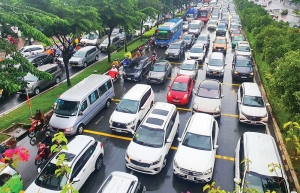Legalities related to insurance for motor vehicle rent
As well as individuals, many passenger transport companies use rental or car-sharing services for their own drivers. However, an important issue that has not been covered much in Vietnam is insurance for rental motor vehicles.
 |
| Kent Wong, partner and head of Banking and Capital Markets at VCI Legal |
Most basic insurance is covered by the car rental company and included within the rental cost. However, there are still optional packages that the car lessee can consider buying more when using a car.
Currently, there is only one type of compulsory civil liability insurance (CCLI) for motor vehicle users. This type of insurance does not apply to motor vehicles but is intended to protect victims in traffic accidents caused by motor vehicles, and at the same time provide financial protection for motor vehicle users against unexpected risks.
Decree No.03/2021/ND-CP dated January 2021 on compulsory insurance for motor vehicle owners also stipulates the CCLI of such users. A “motor vehicle user” refers to an owner of a vehicle or an individual who assigned by the owner of a motor vehicle to legally utilise and operate a motor vehicle. “Insurance beneficiary” refers to a motor vehicle user or operator whose civil liability is insured according to contracts.
For each motor vehicle, the responsibility for paying for CCLI must come from a single insurance contract. Certificates of CCLI of motor vehicle users are proof of CCLI contracts between motor vehicle users and insurers.
Pursuant to the above, a motor vehicle lessee is also considered a motor vehicle user when he has entered into a car rental contract with the motor vehicle owner and is the insurance beneficiary according to the law. The scope of compensation of the CCLI includes non-contractual damages such as health, life, and assets incurred on a third party by motor vehicles, a well as damage to the health and lives of passengers caused by motor vehicles.
Making a claim
If accidents within liabilities occur, insurance enterprises must reimburse beneficiaries for the payment made or will be made to the accident victims by the beneficiaries. In case of the beneficiary’s death or lack of legal capacity according to judicial decisions, enterprises shall directly compensate the accident victims, victims’ heirs (in case the victims are deceased) or victims’ representatives (in case the victims lack legal capacity or are under 16 years of age).
For insurance claims for health and life, liability for health and life casualties caused by motor vehicles shall be VND150 million ($6,500) per individual involved per accident. Specific compensation for health and lives is determined for each type of injury and casualty under the law or according to the agreement (if any) of parties, but must not exceed the amount specified under the law. Judicial decisions shall prevail as long as the amount specified under Annex I of Decree 03 is not exceeded.
In case of accidents which are caused entirely by a third party as determined by the competent authorities, health and life insurance for the third party shall equal 50 per cent of the amount specified under Annex I attached to Decree 03 or the agreement (if any) but must not exceed 50 per cent.
Specific asset compensation/accident is determined based on practical damage and levels of the fault of insurance beneficiaries but must not exceed insurance liabilities. Liability for accidents caused by automobiles shall not exceed VND100 million ($4,350) per accident.
Pursuant to Article 601 of the Civil Code 2015, the person assigned by the owner of the “source of extreme danger” to possess and use the “source of extreme danger” under the law must pay compensation for damages caused by it, except for cases where the owner of the “source of extreme danger” and the person assigned to possess and use it have other agreements not contrary to law, social ethics or are not intended to evade compensation.
Examples of some agreements include: an agreement which states the lessee is fully responsible for an accident; mutually agrees to be jointly compensated for the damage; or agrees that the owner will compensate for the damage first, then the lessee will refund the owner the amount of compensation.
If the owner of the “source of extreme danger” assigns another person to possess or use the “source of extreme danger” which does not comply with the provisions of law, causing damage, the owner must compensate for the damage. For example, if the owner knows that the lessee does not have a driver’s license for a car, but still assigns the right to possess and use it to them and cause damage, the owner must compensate for the damage.
If both the owner and the person assigned by the owner to legally possess and use motor vehicles are at fault for causing the accident, they must be jointly compensated for the damage, according to Article 587 of the Civil Code 2015.
It is also necessary to determine whether the person assigned the “source of extreme danger” is the person who possesses and uses it or not. The purpose is to determine who is liable to compensate for the damage. If it is just an employee hired by the company to drive a car and is paid wages according to the contract, it means that the employee is not the person who possesses and uses that car, the company still possesses and uses that car.
Therefore, the company must provide compensation for any damage. If a person is assigned a car by the company through a car rental contract, it means that the company no longer possesses and uses that car, but that lessee is the legal possessor and user; therefore, the lessee must compensate for any damage.
Types of voluntary insurance
In addition to CCIL, which is mandatory for motor vehicle users, there is optional insurance that can be bought by the car rental company and included in the rental cost. If the lessor does not purchase these types of insurance, the lessee can also purchase additional insurance for the motor vehicle they rent, including Car Occupants Accident Insurance (COAI), and Car Physical Damage Coverage (CPDC).
COAI is a voluntary insurance package; when participating, the insurance beneficiary will have benefits depending on the package chosen.
COAI will usually apply to cases such as deaths due to an accident covered by the insurance, and the company will pay the amount stated in the contract. Mover, if the beneficiary suffers permanent disability due to an accident, the company will pay its disability payout ratio. Meanwhile, CPDC, a non-compulsory insurance package, is also necessary because it can help motor vehicle users reduce their financial burden if they encounter unfortunate cases such as theft or unintended accidents.
The scope to which the insurance company is responsible for indemnifying the beneficiary is usually physical damage caused by natural disasters, unexpected and unforeseen accidents such as crashes or collisions; fire; loss of the entire vehicle due to theft; or a deliberate act of vandalism but not by the insurance beneficiary.
 | Business prospects abound for insurance of car rentals The recent proliferation of car rental and sharing apps has opened up opportunities for a range of new insurance services. |
What the stars mean:
★ Poor ★ ★ Promising ★★★ Good ★★★★ Very good ★★★★★ Exceptional
Related Contents
Latest News
More News
- Shinhan Life Vietnam builds growth on people strategy (October 07, 2025 | 09:45)
- Insurance sector initiates rapid response after Typhoon Bualoi devastation (October 03, 2025 | 18:25)
- Non-life insurers face mounting pressure after typhoon hits motor sector (October 02, 2025 | 18:59)
- Prudential Vietnam delivers responsible investment package (September 25, 2025 | 10:37)
- Insurers struggle to keep pace with EV rapid adoption (August 29, 2025 | 17:12)
- Non-life insurance market in sees bright spots in H1 despite rising challenges (August 28, 2025 | 16:21)
- Life insurance rebounds with renewed growth and trust (August 06, 2025 | 18:04)
- Global Care launches Vietnam’s first insurance KOL platform (July 25, 2025 | 09:42)
- Liberty Insurance leaves mark at 2025 Insurance Asia Awards with dual wins (July 14, 2025 | 07:27)
- New CEO takes helm at Prudential Vietnam (July 07, 2025 | 17:51)

 Tag:
Tag:


















 Mobile Version
Mobile Version